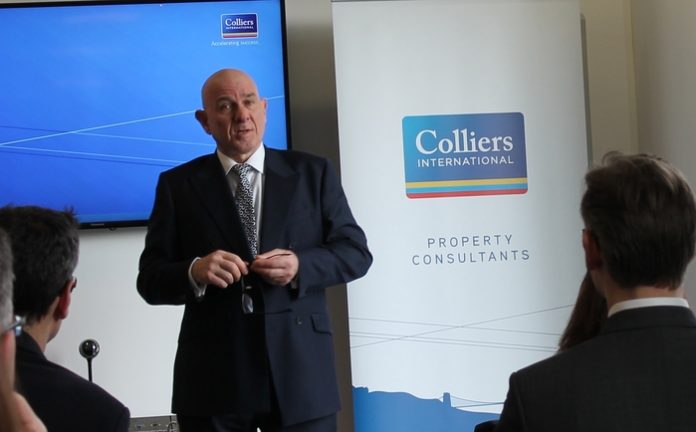
The benefits of having a ‘Metro Mayor’ for the West of England are already apparent less than a year after the West of England Combined Authority came into existence, according to a leading property economist.
Dr Walter Boettcher, UK Chief economist for global commercial property specialist Colliers International, said during a visit to Bristol that the devolved regional authority under Tim Bowles’ leadership has already taken positive steps in bringing a fresh approach to investment and infrastructure.
“I have always said that thinking big is the key to success for the devolved regional authorities. It is not about millions, but billions,” he told an invited audience of business leaders at the Bristol office of Colliers International.
“Andy Street, the West Midlands mayor, certainly gets it, as he has even used that very phrase and has set up a funding commission to look into ways of leveraging up limited central government funds by attracting other investment sources.
“Increasingly, Tim Bowles, the Conservative Mayor of the West of England Combined Authority looks like he gets it too. The creation of the West of England Single Investment Fund which enables alignment of other funding sources with devolved funds is a positive sign that infrastructure projects of scale will become a possibility.
“Visionary projects such as the £8.9 billion transport plan report that WECA is involved in, sets out solutions for addressing transportation problems in Bristol including a rail link to Bristol Airport.”
In his presentation entitled ‘Thoughts on the UK and South West Economies’, Dr Boettcher also pointed out that inward investment can be transformative, adding that parts of the West of England would receive a decisive boost from £50 billion of investment over the next 20 years in building the new Hinkley Point C power station in Somerset.
“That scale of investment and the impacts of Hinkley are already focussing minds and creating a new impetus for developments directly supporting the Hinkley project, and others less directly connected such as the £150 million Bridgwater Gateway business park in Somerset. In addition, part of the Hinkley project team is based in Bristol.”
Dr Boettcher argued that the West of England benefitted from strong links with the ‘real’ economy as opposed to a ‘balance sheet’ economy, and that Purchasing Manager Indices (PMI) for January showed resilient performance from regions such as the South West which have been outperforming London since the EU Referendum vote.
“These figures show that the supply side economy is stable, due to demographic growth, rising house prices, and better export performance driven by sterling’s devaluation.
“In this context, the main event holding back the economy is Brexit uncertainty. Once there is certainty, there will be a boost to the economy and to occupier markets as businesses that have adopted a ‘wait and see’ approach will begin to make decisions about expanding.
“Even if there is a Hard Brexit and the UK leaves the European single market completely, I don’t think we are going to see major companies relocating to Paris or Frankfurt, and we’re not going to see all the bankers going across the Channel with their suitcases.
“It is far more likely that new business lines will be set up in Europe by firms that decide they need to ensure European passporting rights, but that many existing business lines will be retained in the UK. Another dimension to this is AI, or Artificial Intelligence, which is bringing about entirely new business models that are footloose.”
Tim Davies, head of the South West and Wales for Colliers International, said: “Against the backdrop of uncertainty following the Brexit vote, it was a pleasure to have such a positive economic overview for the West provided by Dr Boettcher, and also to hear his views on the way in which the devolved West of England Combined Authority under the Mayor of the West of England Tim Bowles is already making an impact.”


















